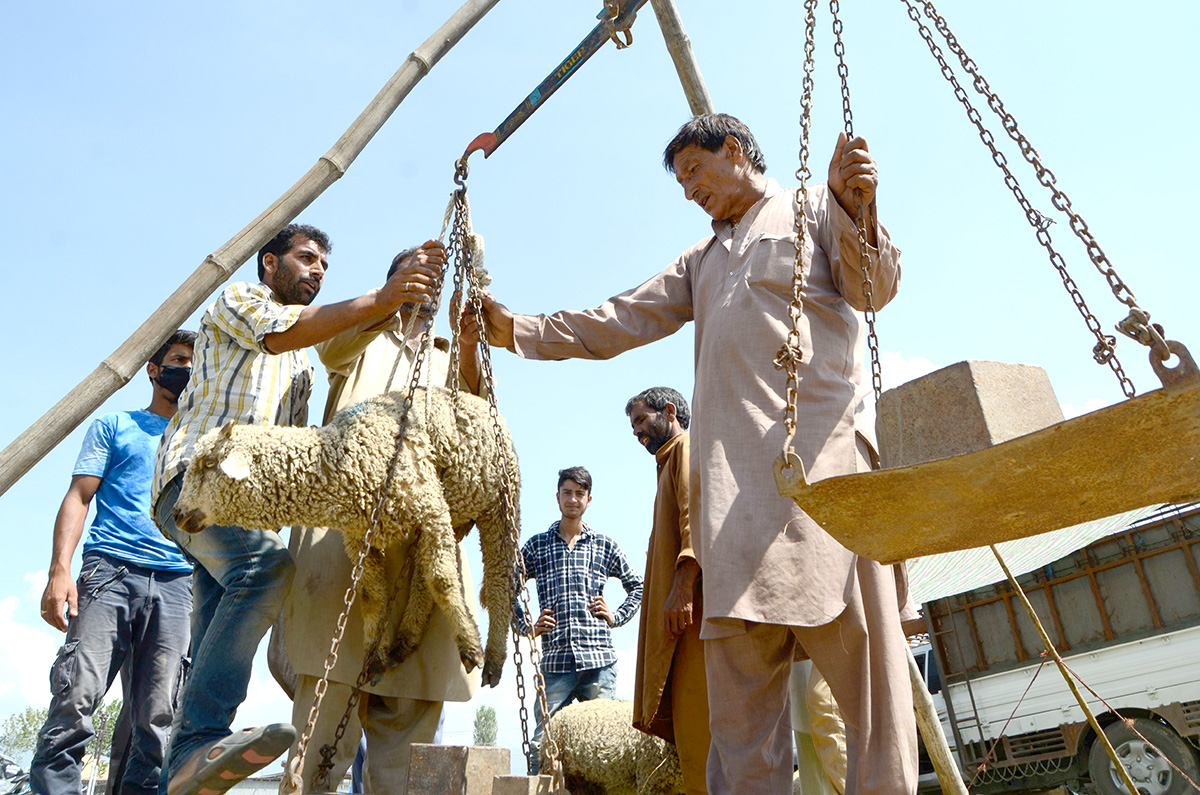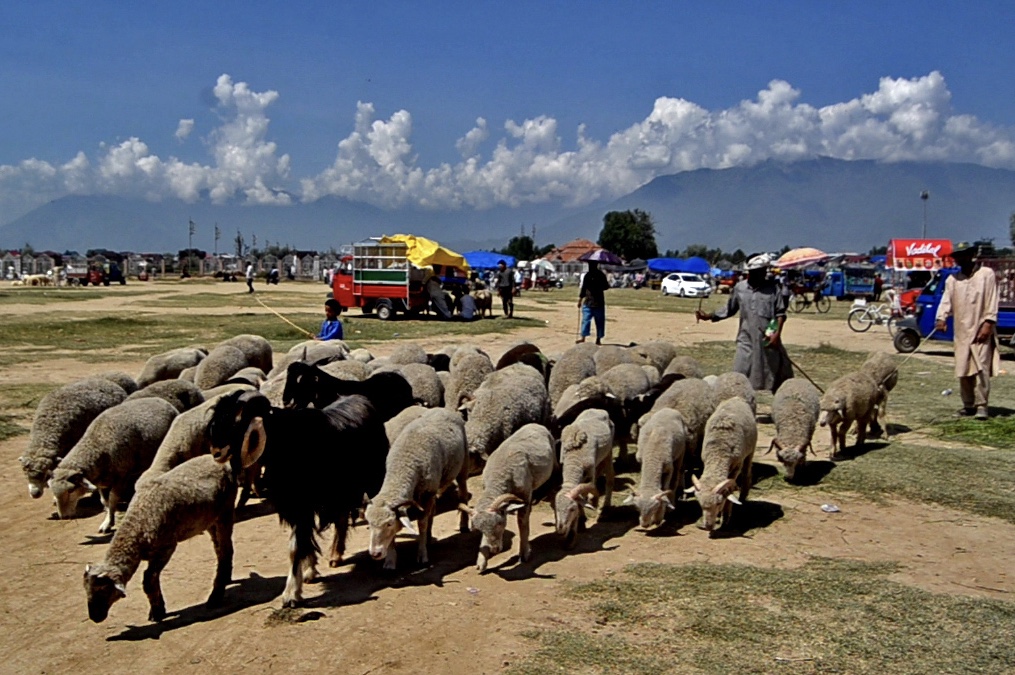With the virus in control of mankind, the Muslims are facing a challenge in managing the animal sacrifices this Eid. The economy has already been dented and the Eid festivities are going to add to the crisis, reports Tasavur Mushtaq

Traders weighing animals at temporary Eidgah market of Qurbani livestock in Srinagar on August 19, 2018. KL Image: Bilal Bahadur
After passing through narrow lanes with multiple intersections, some cobbled alleys lead to the house of Shabir Ahmad Ganai in Srinagar’s Nawakadal area. A professional mutton dealer, Shabir is busy in refurbishing his home and nearby slaughterhouse. Supervising the ongoing work for the past fortnight, he does not move out.
A supplier to local retailers, given the current situation, he has locked his barn. This, however, was not the scene, always. A mutton importer for last more than 20 years, he had a busy schedule in managing the supplies from different states to his customers back home. The process was uninterrupted for the entire year. During the season of marriages or Eid-ul-Azha, he had no time to see even his family.
But this year, as the Eid is round the corner, Shabir preferred to renovate his house. “Market is completely down and there is uncertainty. I preferred not to take risks,” he said.
Come Eid-ul-Azha, the market places were full of Udhiyyah, the animal slaughtered as part of Islamic ritual. While a few would rear sacrificial animals at home, mostly in Kashmir periphery, the city folks would buy it before a few days. Purchasing a sacrificial animal is an elaborate process. Price apart, the animal’s looks, size, age, and weight would matter a lot.
This year, the virus took hold of everything. The festivity of trading is missing. It is fear ruling the city streets. A spike in Covid-19 numbers forced officials to resume a strict lockdown.
For Shabir, it used to be almost a month-long affair. “We had plans in place a month ago to manage all this,” he said. “Normally before Eid, we used to receive 60-70 truckloads from outside markets daily, but this year the situation is different,” he said. “You can imagine the crisis that mandi in Delhi was opened only after July 20.”
Individually, Shabir would sell around nine truckloads as a retailer and rest distribute to his network of retailers. “The type we sell on Eid is usually large so roughly it is 150 per truck. During normal days, a truckload carries more than 175 heads.”
Few miles away from Shabir, lives Waheed in Chattabal area. He owns a shop and is in the retail mutton selling business for most of his life. Known for keeping the good quality mutton, he has restricted his activity to retail this time. Waheed said, on an average, the sales would cross 200 sheep on this occasion. “Besides selling meat at my shop, I used to sell more than 200 sheep to my regular customers for Qurbani.” Not anymore.
Concerned about the losses, Mehrajuddin Gania, general secretary of Wholesale Mutton Dealers Association said there is no demand. “Market is down and we don’t know what is going to happen. They have announced another lockdown, what we would do in all this,” Mehraj said.
Mehraj laments that the Eid after August 5, 2019, met the same fate. “That time we had to incur losses as well. There was full availability but selling did not take place, leaving the flock here for many months.”
On average, Mehraj said more than four lakh sheep/goats are sold on the eve of Eid-ul-Azha, taking the total amount of sales to more than Rs 400 crore. In 2019, he said the community had to bear losses of at least “Rs 25 crore”.
The government he said, has fixed the rate of Rs 230, per kilogram of a live animal. “Nowhere in the world you will see sacrificial animals being sold on weight, it is something buyer likes and purchases primarily on face value.”
Regarding the directions of the government about their operations, he said “there is no advisory either for selling or for slaughtering.”
Another trader, Fayaz Ahmad of Nowhatta said: “The dressing percentage in sheep is around 50 per cent, the rest being offal and wastes. So if the market rate of meat is Rs 600 per Kg, the live animal would go for around Rs 300.”

An October 2013 photograph showing the sacrificial animals on sale in Srinagar.
Celebrations apart, the sacrifice of animals on Eid-ul-Azha is the centuries-old Islamic practice. Muslims throughout the world offer sacrifices in continuation to commemorate the actions of the Prophet Ibrahim (AS). This also marks the completion of Hajj.
However, given the scare due to a sharp rise in the number of infected persons and resulting fatalities, there is a dilemma.
Ajaz Ahmad, a resident of Srinagar is seemingly not willing to go for sacrifice this year. An avid follower, he is sceptical about the safety and well-being of the relatives he used to visit. “Since the day Kashmir reported its first case, I have restricted myself to home barring visiting market once in a while,” he said, “Now this is spreading like anything, how I can risk myself and people whom I visit?”
Ajaz is not a case in isolation. “The situation is not conducive to knock at anybody’s door,” Muhammad Farooq said. “There is a fear as the butcher would go from home to home and can be a carrier of the infection.”
The other concern is of families who have been tested positive in this pandemic, besides the ones where deaths took place.
On July 22, a 58-year-old shopkeeper tested positive in Bemina. Head of the family of four, his home was sealed. With mandatory fumigation and later testing of his other members, it may almost consume his Eid in isolation. “My house is almost a haunted place for the entire area and you talk about Eid and allied activities,” he said on phone.
The situation is grimmer in the families where Covid-19 related deaths took place. “My uncle passed away a few days ago and I was not able to go there. Not even my mother. That is almost a no go area, how can we visit them with meat on Eid,” said Tauseef.
The religious scholars have a different take on the emerging situation of scare and sacrifice. “I don’t understand why Coronavirus should stop anybody from this tradition of sacrifice. We are having meat and chicken otherwise as well. It is a recommendation of Prophet (SAW) that those who can afford should do and those who cannot need not to,” said Dr Tahir, a religious scholar. He further said, “this practice of sacrifice is Wajib.”
A scholar from south Kashmir, Moulana Altaf Hussain Nadvi said, “There is no hard and fast rule to distribute the meat mandatorily. You can have it at home as well.”
Giving details, he said, these are two separate issues, one is sacrifice and the other is the distribution part. The sacrifice part he said is “Wajib and the distribution part is Mustahab, recommended but not essential.”
“In times of pandemic as we fear that this act can cause harm due to communicable disease, it is better to sacrifice and keep meat at home,” he said adding “is mustahabb ko ahmiyat dete huve dusrun ki zindagiyun ke saath khelna gunah hoga (By giving importance to the distribution part which is not mandatory and risking the lives of people, we may turn up being sinful)”
When asked about the concept of giving his meat to needy, Moulana Nadvi said “While giving him meat of Rs 100 we may risk his life and thousands of rupees for possible treatment.”

A seller waits for customers at a makeshift market for sacrificial animals ahead of Eid al-Adha festival in Srinagar on Monday 20 August 2018. KL Image: Bilal Bahadur
At the same time, there is a call from various institutions to “donate the amount” in case anybody has decided to forego. “If you intend to perform Qurbani, that’s good. If you have decided to forego it because of the pandemic, you may help us to build our healthcare response to the pandemic,” is the message from the local charitable institution, Infaaq foundation
The charities in Kashmir, which have been working round the clock for the last five months, have horrifying details of the situation on the ground. Since the pandemic has devastated the economic systems, tens of thousands of people have lost their livelihoods, they say a lot of funds are required to manage the basics in the seriously suffered section of the society. People have started understanding the newer challenges.
In categorical terms, the Islamic scholars have said that giving alms is not a substitute for the Udhiyyah. “There are clear guidelines. No room for ambiguity whatsoever in regards who can perform the sacrifice and how, when and where it can,” said Dr Tahir.
Dr Hameedullah Marazi, who teaches at the Central University of Kashmir said Muslims who can manage sacrifices can go for it at a very limited scale. “If the situation does not permit that they can skip,” he said.
The doctors working on the ground suggest the movement of people for distributing the mutton may surge the infection. “Normally we see people move around together to distribute the meat, it is a threat and then the number of hands the piece of meat changes makes it more susceptible,” said Dr Shakeel-ur-Rehman, a senior doctor in the health department.
Nodal officer of Covid-19 measures and head Social and Preventive Medicine (SPM), Dr S Muhammad Salim Khan says, “Distribution is a risky job. It involves many people and many homes. Proper precautions should be taken like wearing masks, wrapping meat properly, and cleaning it properly,” he said. “If precautions could not be taken, this could be the reason of rising.”
The post Qurbani Tensions appeared first on Kashmir Life.
from Kashmir Life https://ift.tt/3hM7kvm
via IFTTThttps://kashmirlife.net
No comments:
Post a Comment